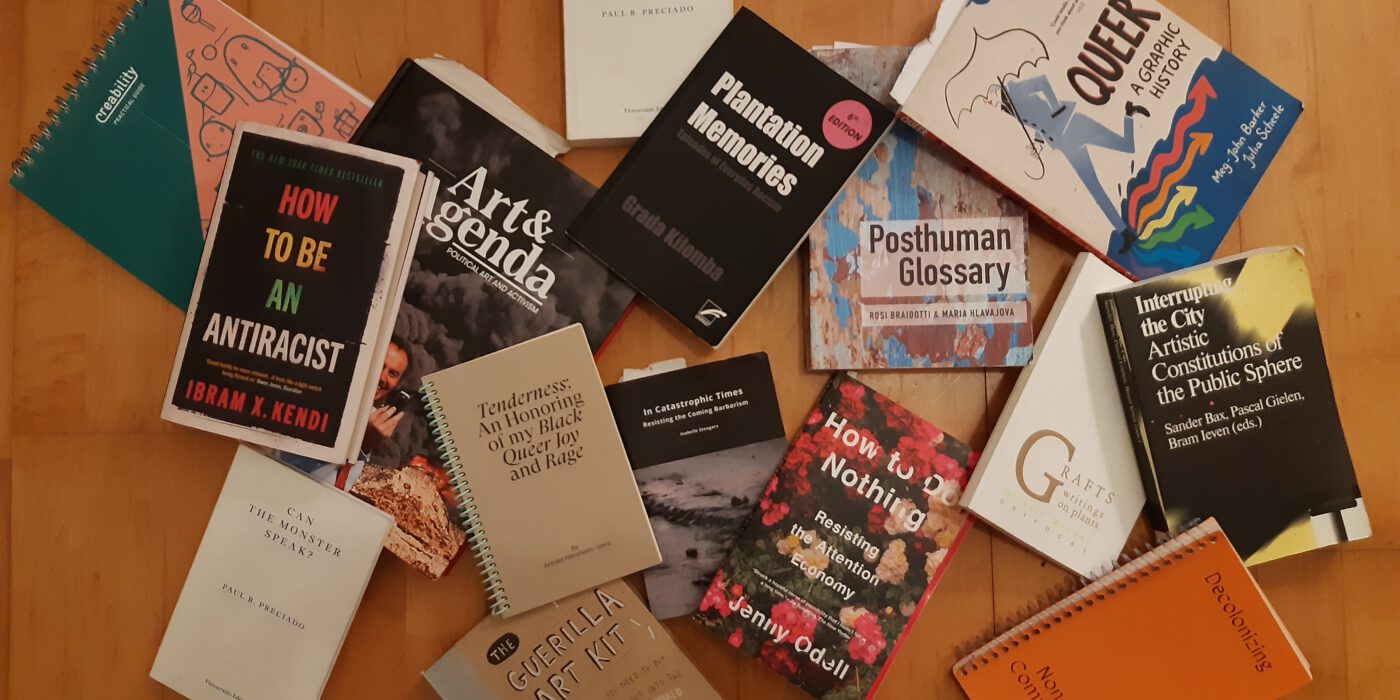Many texts have been feeding and entwining with this research, they act as collaborators in the studio with me, as conversation partners, educators and inspirers.
“Why is it my binary friends, that you are convinced that only subalterns possess an identity? Why are you convinced that only muslims, Jews, queers, lesbians, trans folk, people who live in the banlieues, migrants and Blacks have an identity? Do you therefore believe that you – the normal, the hegemonic, the bourgeois white psychoanalysts, the binary, the patriarchal-colonials- have no identity? There is no identity more rigid and sclerotic than your invisible identity. Than your republican universality. Your weightless, anonymous identity is the privilege of sexual, racial and gender norms.”
Paul B Preciado, Can the Monster Speak?
“What’s the problem with being “not racist”? It is a claim that signifies neutrality: ” I am not racist, but neither am I aggressively against racism.” But there is not neutrality in the racism struggle. The opposite of “racist” isn’t “not racist.” It is “anti-racist.” What’s the difference? One endorses either the idea of a racial hierarchy as a racist, or racial equality as an antiracist. […] One either allows racial inequities to persevere, as a racist, or confronts racial inequities, as an antiracist.
There is no in-between space safe space of “not racist.” The claim of “not racist” neutrality is a mask for racism.
This may seem harsh, but it’s important at the outset that we apply one of the core principles of antiracism, which is to return the word “racist” itself back to it’s proper usage. “Racist” is not- as Richard Spencer argues-a pejorative. It is not the worst word in the English language; it is not the equivalent of a slur. It is descriptive, and the only way to undo racism is to consistently identify and describe it-and then dismantle it. The attempt to turn this usually descriptive term into an almost unusable slur is, of course, designed to do the opposite: to freeze us into inaction.”
Ibram X.Kendi, How to be an Antiracist
“We can learn to work and speak when we are afraid in the same way we have learned to work and speak when we are tired. For we have been socialized to respect fear more than our own needs for language and definition, and while we wait in silence for that final luxury of fearlessness, the weight of that silence
will choke us.”
Audre Lorde, The Transformation of Silence into Language and Action
“[the posthuman] opens up the self as an extended, distributed, interconnected, and relational entity ’embodied and embedded’. A posthuman subject embraces ‘affirmative politics’ which combine ‘critique with creativity‘ in pursuit of alternative ways of living with one another.‘
Dan Goodley, Rebecca Lawthorn, Kirsty Liddiard and Katherine Runswick-Cole referencing Rosi Braidotti in Posthuman disability and Dishuman studies-The Posthuman Glossary.
” [there] can be no “nature” outside the human.…Trans-corporeality means that all creatures, as embodied beings, are intermeshed with the dynamic, material world, which crosses through them, transforms them, and is transformed by them.
The figure/ground relation between the human and the environment dissolves as the outline of the human is traversed by substantial material interchanges. Mapping those interchanges across all species and at all scales is the prelude to trans-corporeal ethics and politics. Trans-corporeality contests the master subject of Western humanist individualism, who imagines himself as transcendent, disembodied, and removed from the world he surveys. The trans-corporeal subject is generated through and entangled with biological, technological, economic, social, political and other systems, processes, and events, at vastly different scales. Trans-corporeality finds itself within capitalism, but resists the allure of shiny objects, considering instead, the effects they have, from manufacture to disposal, while reckoning with the strange agencies that interconnect substance, flesh and place.”
Stacy Aliamo, Transcorporeality
What is needed then is not a “once-and-for-all” type of quitting but ongoing training: the ability not just to withdraw attention, but to invest it somewhere else, to enlarge and proliferate it, to improve its acuity.
[…]
What the attention economy takes for granted is the quality of attention, because like all modern capitalist systems, it imagines its currency as uniform and interchangeable. “Units” of attention are assumed undifferentiated and uncritical. To give a particularly bleak yet useful example, if I’m forced to watch an ad, the company doesn’t necessarily know how I am watching the ad. I may indeed be watching it vey carefully, but lie a practitioner of aikido who seeks to better understand her enemy- or for that matter like Thomas Merton observing the corruption of the world from his hermitage.
Jenny Odell, How to do Nothing
